Physical Address
304 North Cardinal St.
Dorchester Center, MA 02124
Physical Address
304 North Cardinal St.
Dorchester Center, MA 02124
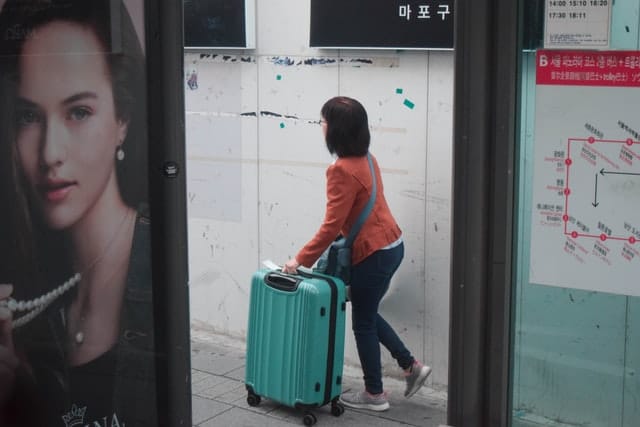
For many years, China and Japan dominated the expat scene in South Korea. But, at long last, it’s getting the attention it deserves! Short-term getaways, work vacations, and gap year stays attract visitors. Staying and becoming a long-term resident is not unusual.
The choice to host the Summer Olympics in 1988 was significant in drawing tourists to South Korea. People began to recognise that South Korean culture, language, and cuisine are unlike anything else in Asia.
Korean cuisine took considerable time to gain international acclaim. The globe now knows about the country’s nutritious and excellent cuisine. Many tourists go to South Korea because of its cuisine!
Korea has four distinct seasons as well as a diversified geographical landscape. Mountains, hills, agriculture, and deciduous woodland can be found all over the country. South Korea has a lot to offer, regardless of your interests, travel bucket list or if you are are looking to up sticks and get yourself a property in Seoul.
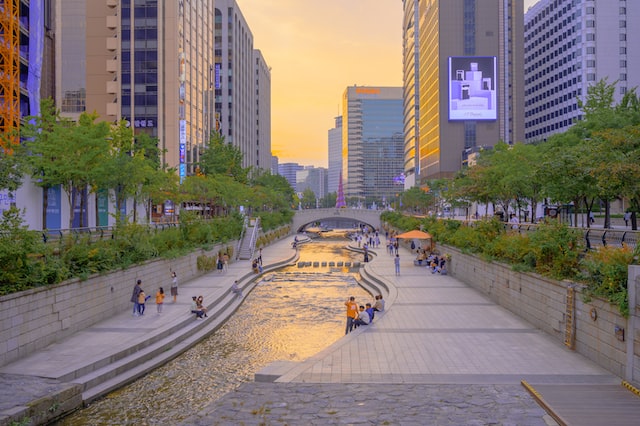
Seoul, the capital of South Korea, is the greatest option for expatriates. If you are constantly on the move and enjoy partying, Seoul is ideal for you. There is always an event occurring in this city at any given time. Whether you love concerts, festivals, pubs, or mountain walks, you will be able to find something to your liking.
This dynamic city combines palaces, temples, cutting-edge design, and mountain paths, all set to a relentless K-Pop beat, which is both fashion- and technology-forward, but yet deeply traditional.
In the past ten years, Seoul has exerted significant effort to transform its industrial edges into an appealing urban ideal of parks, culture, and design. At the beautiful Dongdaemun Design Plaza & Park and City Hall, glass, concrete, and steel are shaped into organic forms. The popularity of the beautifully designed parks along the central Cheong-gye stream and the Han River has prompted the development of additional green spaces and bike paths. Join Seoulites as they spend their leisure time shopping in fashionable boutiques and drinking in hip cafés and convivial pubs.
From atop any of Seoul’s four guardian mountains, one can sense the potent pungsu-jiri (feng shui) that has nourished and protected the city for centuries. The “Miracle on the Han,” a phoenix that sprang from the ashes of the Korean War, is clung to tenaciously by the annals of history. In spite of Seoul’s evident focus on the future, you will find fascinating remnants of the past in World Heritage–listed monuments such as the Jongmyo shrine, in the lanes between the beautiful hanok (traditional wooden houses) in Bukchon, and when strolling along the spectacular Seoul City Wall.
Seoul can satisfy your needs at any time of day or night. A visit to a temple in the early morning can lead to a palace tour, followed by tea-drinking in Bukchon and gallery-hopping in Samcheong-dong. Soju (a drink similar to vodka) and snacks at a street tent bar will fuel you for nighttime shopping in the Dongdaemun or Namdaemun night markets, partying in Hongdae or Itaewon, or singing in a self-service karaoke noraebang. This is followed by heating, soaking, and sleeping in a jjimjilbang (sauna and spa). By the time you check your watch, morning will have returned.
Since public transportation is excellent, there is no reason not to travel beyond the city borders. The intimidating Demilitarized Zone (DMZ), which separates South and North Korea, has a strong pull and makes for a captivating day excursion. To the west, Incheon is a fascinating port where the modern world flooded into Korea at the end of the 19th century, and its Chinatown and waterfront continue to be an unique mix of people today. Suwon, located in the south, is home to King Jeongjo’s remarkable World Heritage–listed defenses, which wind 3.5 miles (5.7 km) past magnificent gates and pavilions.
Pros:
Bustling capital city
Large expat community
Excellent bars and nightlife
Cons
Expensive
Cold Winters
Seoul is often compared to other major cities around the world when discussing cost of living. Despite its reputation as one of the more expensive cities in South Korea, it remains affordable relative to cities like New York or London. Rent in Seoul can vary significantly depending on the neighborhood. Areas like Gangnam and Itaewon tend to be pricier, with modern apartments and conveniences at a premium. Basic utilities contribute to monthly expenses, involving electricity, heating, cooling, and water systems. Public transportation, however, offers an affordable and comprehensive network across the city, making commuting cost-effective and efficient. Daily living expenses such as groceries and dining out can be manageable with local cuisines being notably cheaper than Western alternatives.
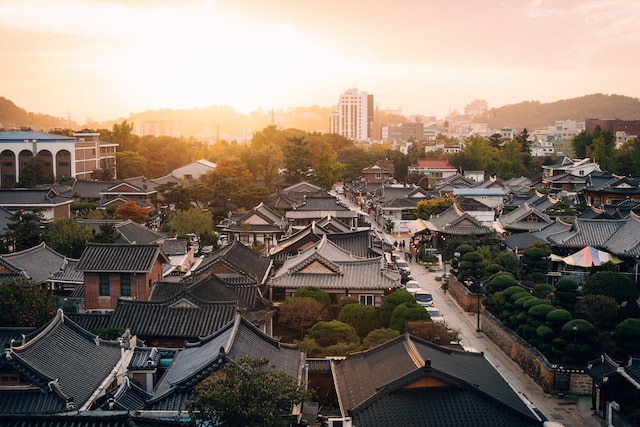
Jeonju is a medium-sized city known for its rural surrounds. Its name means “excellent region” in Korean. The perfect agricultural terrain here has had a significant impact on the city’s long history. Hanok Village, an area of town with mediaeval buildings and traditions, attracts history aficionados.
The city’s main lure is tourism, with historians, foodies, music fans, and art connoisseurs all represented. A film festival and the International Sori Festival, a celebration of songs and musical acts from around the world, are both held annually.
When it comes to food, Jeonju is a fantastic destination. That’s a big deal in a country where cuisine is already highly regarded! As part of UNESCO’s Creative Cities Network, it has been designated as a Creative City for Gastronomy.
Jeonju is the birthplace of some of Korea’s most popular dishes. This town is where the popular cuisine known as (bi-bim-bap) — mixed rice, a bowl of rice and mixed veggies with a spicy sauce that frequently contains a fried egg — originated.
Jeonju may not be as interesting as many of the places listed above, but it is the place to experience South Korean culture and customs. Not only will you have the opportunity to genuinely explore South Korea, but it also has a fantastic cuisine scene and was awarded an Asia Culture Center in 2012.
Try the popular Korean meal Bibimbap in Jeonju, its birthplace.
Who Would Enjoy Living There: Native English Speakers, Solo Travelers, and Couples
Pros:
Incredible cuisine
Many amazing cafes
Diverse cuisine options
Cons
The nightlife is uninteresting
Inaccessibility to Western foods
Adapting to the lifestyle may be challenging.
Jeonju’s cultural vibrancy is widely recognized through its array of celebrated festivals. The Jeonju International Film Festival, held annually, draws cinephiles from across the world, showcasing a diverse range of independent films. It acts as a vital platform for filmmakers to present their works and exchange ideas. Additionally, the Jeonju Hanji Culture Festival celebrates traditional Korean paper-making, allowing participants to engage in hands-on workshops. For music lovers, the Jeonju Sori Festival brings together a blend of traditional Korean music and Western performances, enthralling a diverse audience with its distinct repertoire of sounds.
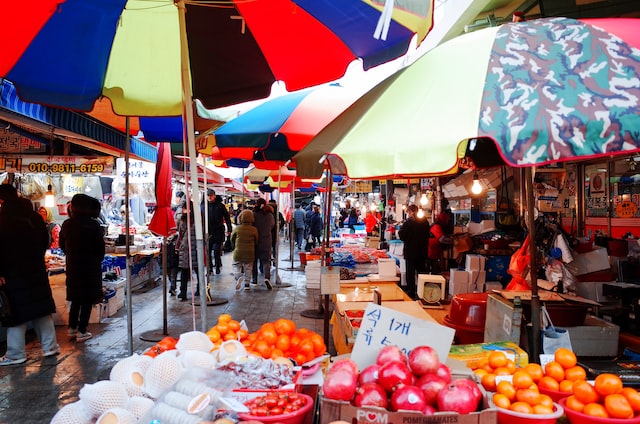
Pohang is a rich city with a strong economy. POSCO, the world’s second-largest steel firm and the region’s largest employer, is headquartered here. Engineers, designers, and scientists from all around the world are hired by the giant corporation to work in their steel plant. The Pohang Steelers, a local soccer team, is named after them.
Pohang, however, is much more than just a steel town. The picturesque city is located on the coast and will keep you occupied. There are numerous hiking trails and public sports facilities in the area, as well as shopping opportunities that include both traditional markets and expensive malls.
The city’s position puts it in close proximity to a number of significant historical sites. The UNESCO World Heritage Sites of Gyeongju Historic Area and Seokguram Grotto are also only a short bus ride away.
Pohang City is located in South Korea’s eastern Kyongsang-namdo province. With a population of over 500,000, Pohang is a densely populated city. One may experience both nature and modern life in Pohang City. You may enjoy arcades and excellent street food in the city, go fishing and climb mountains.
There is no need to travel outside to experience something new; everything is contained within. Every summer, the manufacturer POSCO blasts hundreds of tons of fireworks to attract spectators. People often stop their automobiles in the middle of the road to observe it because it is so enormous and stunning.
Who Would Enjoy Living There: If
Pros:
Lots to see
Some great small diners
Cons
Not a lot of expats (if you are one)
Pohang offers its residents stunning coastal amenities that complement the urban lifestyle of the city. Bukbu Beach is a popular destination, frequented by locals and tourists alike, providing a serene environment for relaxation and various water sports. The nearby Homigot Sunrise Square is known for its iconic Hand of Harmony sculpture, where visitors gather early to witness the sunrise over the East Sea. Pohang’s bustling fish markets provide a glimpse into the local maritime culture, where fresh catch and seafood dishes delight culinary enthusiasts. These coastal attractions contribute significantly to the quality of life for those who call Pohang home.
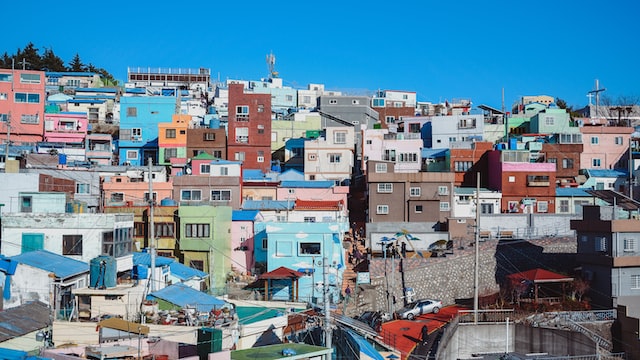
A great combination of urban and laidback lifestyle, Busan is an excellent choice for you if you find Seoul overwhelming. Busan has a warmer winter than Seoul and beautiful beaches to go along with that; it is perfect for those who love the outdoors. There is a large expat community in this city which helps when you are trying to grow accustomed to a new country.
Pros:
Large expat community
Beautiful beaches
Incredible seafood
Cons
Western food can be expensive
International flights are limited
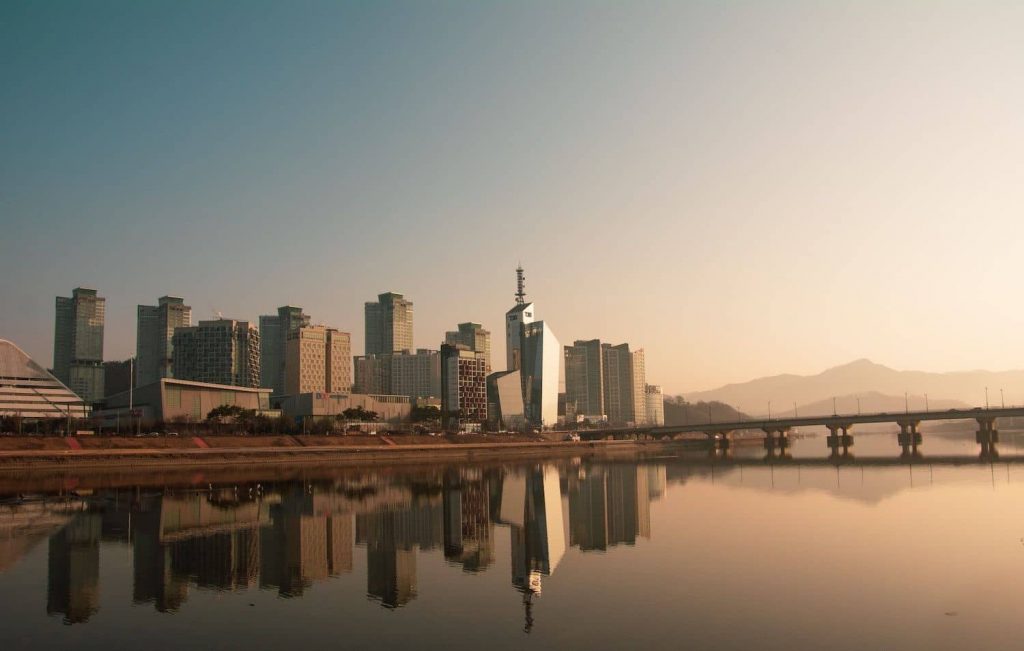
Daejeon is renowned as the city of science and is ideal for people who wish to reside in a large metropolis that is not overly crowded. It is considerably less hectic than Seoul and Busan, but there are still plenty of activities to keep you entertained as well a bustling pub and bar scene.
In the 1980s, the Korean administration chose to shift some of its functions from the national capital (Seoul), to other cities. Currently, Daejeon is home to twelve national government offices, including the Korea Customs Service, Small and Medium Business Administration, Public Procurement Service, National Statistical Office, Military Manpower Administration, Korea Forest Service, Cultural Heritage Administration, and Korean Intellectual Property Office, in addition to the Patent Court of Korea.
Pros:
Easy access to the rest of South Korea
Great hiking trails
Large expat population
Cons
Can run out of things to do
Very cold winters
Daejeon stands out as a hub for educational excellence, home to some of South Korea’s most respected institutions. The Korea Advanced Institute of Science and Technology (KAIST) is at the forefront of research and innovation, contributing to the city’s reputation as the “Silicon Valley of Korea.” Chungnam National University and Hanbat National University further bolster Daejeon’s academic landscape, offering a range of programs that attract students from across the country and the globe. This concentration of knowledge and research institutes fosters an intellectually stimulating environment, making Daejeon a magnet for academics and researchers.
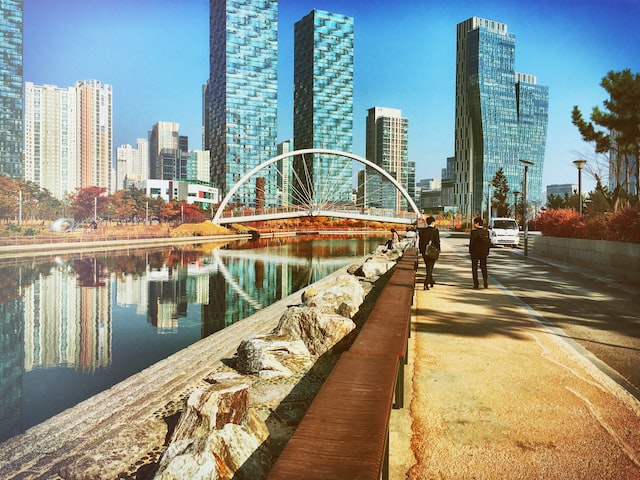
The major international airport in South Korea is located in Incheon, making travel extremely convenient. Incheon has a lower cost of living than Seoul and is less crowded and congested. When you wish to escape the city for the day, Incheon’s shoreline is lined with beautiful islands.
Arts, entertainment, fashion, history, and nature are all available in Incheon. The completion of the city’s grandiose real estate development is anticipated for 2015. It also anticipates a big number of visitors for the Asian Games in 2014. In the Bupyeong neighborhood, visitors may peruse designer boutiques, attend events at the Arts Centre, and learn about local history at Liberty Park and Independence Memorial Hall. Visit the only recognized Chinatown in the country for authentic cuisine and souvenirs. A ferry voyage to the surrounding islands provides the ideal break from the bustling city.
Pros:
Easy access to the rest of South Korea
Great hiking trails
Large expat population
Cons
Not many English speakers
Intense work culture
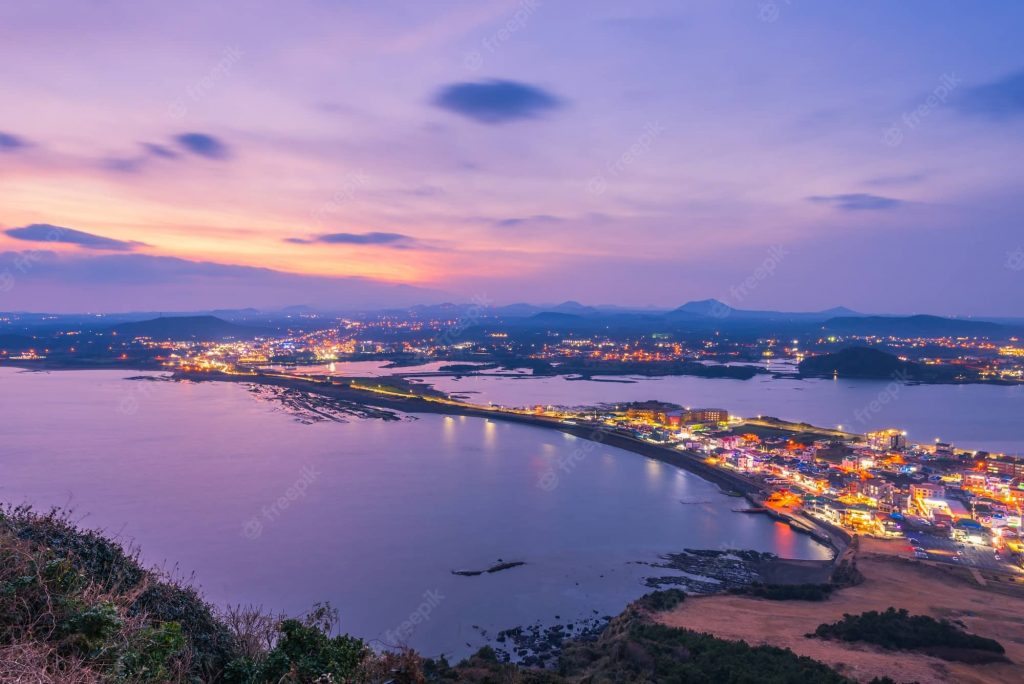
Jeju City, located on the island of Jeju, is an extraordinarily beautiful and remarkable place with several tourist attractions. It features mild weather, lovely beaches, and a plenty of outdoor activities. If you want to feel like you’re on a perpetual vacation, you should move to Jeju City.
Where else can you find an azalea-covered volcano to climb, a sisterhood of deep-divers, and old stone statues to make wishes upon? Jeju Island. This popular resort is a favorite among honeymooners (and K-drama fans) and features miles of golden beaches, winding coastal trails, and Jeju Waterworld, the region’s largest water park. No of your preferences, a day of sightseeing is not complete without sampling the island’s delectable raw seafood and renowned barbecued black pork.
Jeju City is blessed with an abundance of natural wonders that contribute to its charm and allure. Hallasan Mountain, a dormant volcano and the island’s highest peak, offers numerous trails for hikers and nature enthusiasts, showcasing the island’s unique flora and fauna. The Jeju Olle Trail network provides an extensive network of paths that meander through scenic landscapes, taking visitors past cliffs, charming villages, and picturesque coastlines. These trails offer a deep connection with nature, providing a peaceful retreat from the hustle and bustle of urban life. Jeju’s commitment to preserving its natural beauty enhances its appeal as a destination for those seeking both relaxation and adventure.
Pros:
Great beaches
Affordable
Cons
Small island/isolation feel
Small expat community
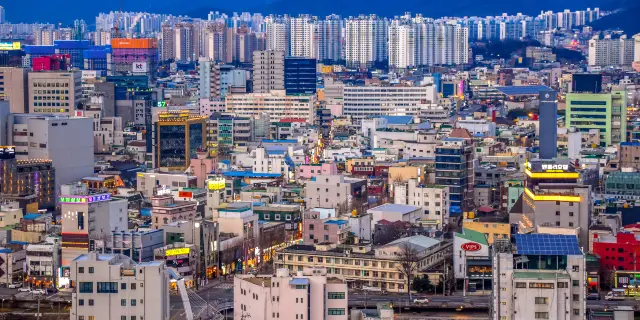
Gwangju may be smaller than the cities previously listed, but that does not imply that you cannot enjoy yourself in this city. There are various things to do in Gwanju, which offers a wonderful blend of cultural and contemporary pursuits.
Gwangju, the sixth-largest city in Korea, is distinguished for its influential political past and respect for the arts. The May 18 Democratic Uprising, a 1980 public demonstration against South Korea’s then-authoritarian military administration, is widely regarded as the cradle of Korean democracy. Its repercussions on the city’s character continue to this day. Investing in museums, exhibitions, and festivals has resulted in a profusion of art, which can be viewed at every turn.
Pros:
Easy to get around
Affordable
Cons
Nighlife a little lacking
Western food not available as much as other cities
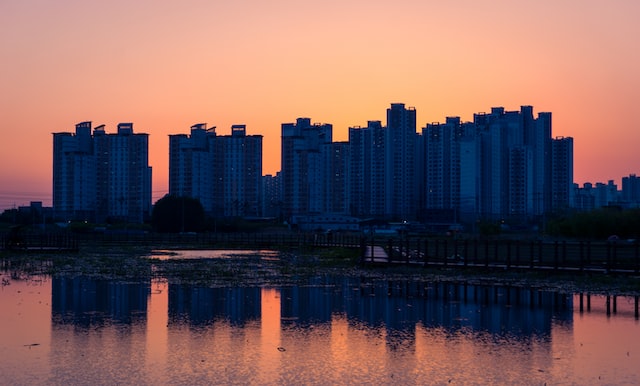
Daegu, the third-largest city in South Korea, is home to enchanting cafes and local markets. Numerous restaurants and bars, many with a western and cosmopolitan flavor, are available. In addition to a vibrant nightlife scene and gorgeous mountains and parks, Daegu also offers a vibrant nightlife scene.
The fourth-largest city in South Korea is a pleasant and progressive place with a fascinating traditional-medicine market, a historic core region brimming with heritage, old churches, and missionary mansions, some superb dining options, and a lively downtown that is a joy to explore. Daegu is a popular destination for exchange students and English teachers, and the city’s huge student population lends it a youthful, carefree atmosphere.
Daegu (often written Taegu) is a fantastic centre for day travels, including to Haein-sa and Jikji, both of which offer temple-stays, thanks to its straightforward three-line metro system. According to the hanja characters found on maps and signs, the name Daegu translates to “Big Hill.”
Pros:
Lovey food markets
Great Nightlife
Cons
Small expat community
Incredibly hot summer months
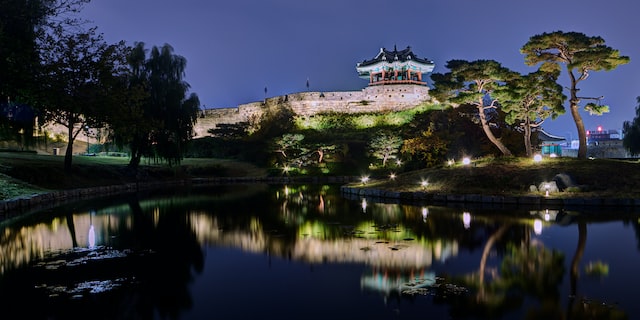
Suwon, located less than 30 kilometers from Seoul, is ideal if you desire the choice of a fast-paced lifestyle without actually living it every day. In addition to its cultural and historical significance, it is home to Samsung’s flagship factory.
Suwon () is the largest city in Gyeonggi-do province and a popular day trip from Seoul. World Heritage–listed defenses still encircle the city’s core. Suwon nearly became the nation’s capital in the 18th century, when Joseon dynasty ruler King Jeongjo constructed the 5.7-kilometer-long (3.5-mile-long) walls in 1794–96 prior to relocating the royal court to the south. However, the monarch passed away, the seat of authority stayed in Seoul, and Suwon ended up with an incredible tourist attraction. The city is located approximately 30 kilometers south of Seoul.
Pros:
Close to Seoul
Relaxed city
Cons
Not many activities
Cold winters
South Korea is a country of fascinating contrasts between the modern and the rural. Whatever your requirements you’re bound to find something attractive in one the great cities in South Korea.